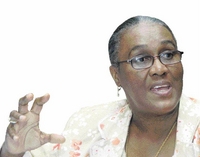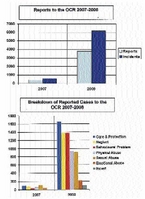Mary's mountain
Published: Sunday | December 13, 2009

Children Advocate Mary Clarke - Ricardo Makyn/Staff Photographer
HUNDREDS of suspected cases of child abuse hang in the balance as the overburdened agency mandated to protect the welfare and rights of children struggles to carry out investigations.
"Last year, we received some 457 complaints directly, and a further 72 from the Children's Registry," said Children's Advocate, Mary Clarke, who admitted that the Office of the Children's Advocate (OCA) was frustrated because of the inability to speedily move along many cases.
Faced by this mountain of unresolved cases, Clarke lamented that the OCA was suffering from serious resource constraints. "We cover the entire island, and we have only two investigating officers. We would love to have at least one in every county who would remain there.
"Secondly, we need somebody to supervise these people. It's difficult for me and I have to travel out to investigate cases myself," she said.
The children's advocate said that since taking up the post in February 2006, she had been "head cook and bottle washer". "I'm doing everything. I have to go take the registers, check them, see that they are updated, follow up with the investigators," bemoaned Clarke.
Her plea for additional staff has been unsuccessful. "It was approved at one level and when it went to some other higher level, they turned it down."
Clarke said she understood the current fiscal constraints of the Government and revealed that she was working on a proposal outlining ways in which staff from different institutions within the public service could be reallocated to aid the work of her office.
The proposition is still at an embryonic stage.
lack of resources

Clarke believes she has done "exceedingly well" during her nearly four years as children's advocate. She also said despite the lack of resources, the team at the OCA had "done much more than would have been expected with our constraints".
A Sunday Gleaner investigation unearthed an internal document issued by Clarke, in February this year, lambasting her skeletal staff for not giving sufficient attention to far too many of the complaints of abuse received. She also took them to task for the snail's pace with which other cases were being addressed.
The documents obtained by our news team showed that the complaints register had at least 110 cases - some of which had been received two years ago - that had not been officially closed up to February this year.
Checks with the records unit at the OCA revealed that, on average, five to eight complaints were received on a daily basis. "The serious cases are entered in the register of complaints, those that need urgent attention," said the employee with whom our news team spoke. These include claims of sexual and physical abuse, plus grievances brought against "relevant authorities", such as the police, educational institutions and hospitals.
suspected police abuse
The employee divulged that reports lodged against members of the Jamaica Constabulary Force were mostly issues of suspected police abuse of a minor, or the inaction of the police in dealing with matters involving a child. Complaints lodged against schools usually concerned suspensions and expulsions, as well as allegations of sexual and physical abuse of students at the hands of teachers.
The Gleaner reported on Friday that Minister of Education, Andrew Holness, was seeking to enact legislation to ban the use of corporal punishment in schools in the next legistative year. This, after reports of an allegation that a five-year-old student had had his arm broken after a teacher punished him last month.
"A check with the registrar of complaints is still indicating an unsatisfactory number of cases which are open. For some, there are no entries in the column 'Action Taken', and even when entries are made, they are listed "inadequate".
"There are few entries which clearly state 'actions taken to redress the infringement of rights reported to the OCA'," Clarke emphasised in the document.
On February 12 when Clarke issued the document, 17 cases from 2007 were on an attached list she had labelled as 'Needing Urgent Attention'. The list also had 70 pressing cases from last year that had not been closed. The nature of the complaints was not detailed in the document obtained by The Sunday Gleaner's investigative team.
Another internal document issued by the children's advocate a day earlier listed 23 cases. "The undermentioned cases are still outstanding. You are expected to make entries on every action taken," Clarke noted in a document addressed to the office's two investigation officers.
"So many cases have as their last entry 'file handed over to legal officers'. What exactly is their current status?" questioned Clarke.
She also noted that a meeting would have been held on February 19, 2009, to discuss the cases. "No excuses for absence will be accepted," Clarke warned.
In the same breath, Clarke also told her investigating officers that none of them "should be driving for extended kilometres to investigate one case, except in rare circumstances".
She also instructed that "cases should be dealt with on a regional or parish basis, allowing for more than one case to be investigated in one trip".
tyrone.reid@gleanerjm.com
Abuse of power?
Most cases investigated by the OCA are against state-funded entities
CHILDREN'S ADVOCATE Mary Clarke has revealed that the bulk of complaints received by her office regarding the abuse of the rights of children across the island are lodged against employees of state-funded entities.
"Most of our cases that we investigate are cases involving relevant authorities, like educational institutions," Clarke said.
In an interview with The Sunday Gleaner on Friday, Clarke pointed out that the Child Care and Protection Act defined "relevant authorities" as "any ministry, department or agency receiving a subvention from the Government".
While Clarke divulged that her office received hundreds of child-abuse complaints from the public last year, she could not say how many of the outstanding cases were in dire need of attention.
the lion's share
However, she was sure that state-funded entities, like the Jamaica Constabulary Force and schools, accounted for the lion's share of the complaints.
"When I get a complaint that has been reported to the police and they have done nothing, then I have to investigate the non-action of the police, or (that) this (case) has been reported to the CDA (Child Development Agency) and they (complainants) are not happy with how it was dealt with. Then it is my responsibility to investigate," Clarke explained.
Clarke continued: "People will say they report this to the CDA; they report this rape case to the police and they have done nothing. We can't just refer it back to them."
Detailing the dire financial straightjacket hampering the OCA in its bid to fulfil its mandate, Clarke also pointed out that her assistant - the deputy children's advocate - was a retired judge who worked part-time.
In its annual report, covering the period February 2006 to March 2007, the OCA noted that "the rights and best interests of children are severely challenged by", among other things, "inadequate support services and at times, lack of timely responses to the plight of children".
tyrone.reid@gleanerjm.com
Mary's wish list
Intake officer/counsellor stationed in office to receive and document the complaints.
A senior lawyer to supervise the two lawyers on staff.
One investigation officer per county.
A supervisor for the investigation officers.
Source: Office of the Children's Registry
The Office of the Children's Advocate, a commission of Parliament, was created under the Child Care and Protection Act in 2004, and the first children's advocate was appointed in January 2006.
The mandate of the OCA is the protection and enforcement of the rights of children.








